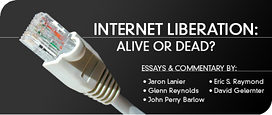John Perry Barlow asks:
I guess we’ve run out of time, but to the extent we haven’t, might I encourage you to address one question? I want to know whether you think that the Internet is a liberating phenomenon. I still do.
I absolutely do. And there’s no better evidence than that dictators continue to fear it, as demonstrated by this rather sad story about Google capitulating to Chinese censorship demands. But regardless of the (perhaps predictable) tendency of big corporations to sell out, I think that the liberating power of the Internet exceeds the ability of the Chinese government, and its corporate collaborators, to snuff it, and I think we’ll see that demonstrated quite clearly before the decade is out.

